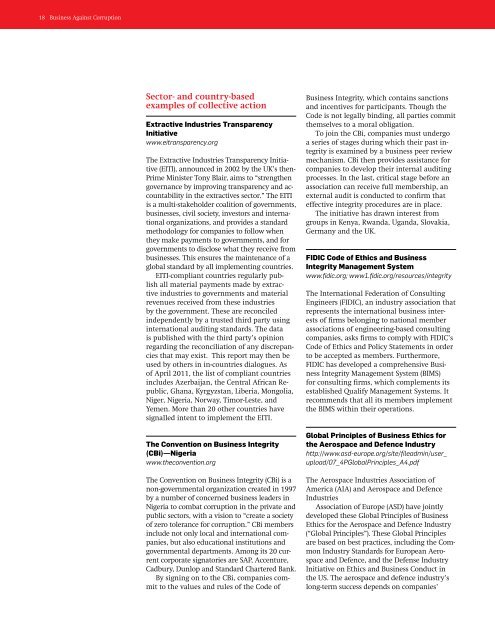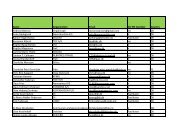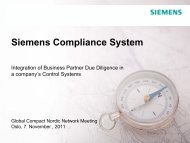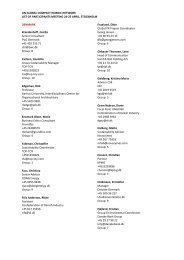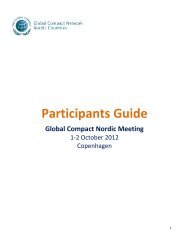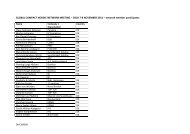Business Against Corruption - A Framework for Action - International ...
Business Against Corruption - A Framework for Action - International ...
Business Against Corruption - A Framework for Action - International ...
- No tags were found...
You also want an ePaper? Increase the reach of your titles
YUMPU automatically turns print PDFs into web optimized ePapers that Google loves.
18 <strong>Business</strong> <strong>Against</strong> <strong>Corruption</strong>Sector- and country-basedexamples of collective actionExtractive Industries TransparencyInitiativewww.eitransparency.orgThe Extractive Industries Transparency Initiative(EITI), announced in 2002 by the UK’s then-Prime Minister Tony Blair, aims to “strengthengovernance by improving transparency and accountabilityin the extractives sector.” The EITIis a multi-stakeholder coalition of governments,businesses, civil society, investors and internationalorganizations, and provides a standardmethodology <strong>for</strong> companies to follow whenthey make payments to governments, and <strong>for</strong>governments to disclose what they receive frombusinesses. This ensures the maintenance of aglobal standard by all implementing countries.EITI-compliant countries regularly publishall material payments made by extractiveindustries to governments and materialrevenues received from these industriesby the government. These are reconciledindependently by a trusted third party usinginternational auditing standards. The datais published with the third party’s opinionregarding the reconciliation of any discrepanciesthat may exist. This report may then beused by others in in-countries dialogues. Asof April 2011, the list of compliant countriesincludes Azerbaijan, the Central African Republic,Ghana, Kyrgyzstan, Liberia, Mongolia,Niger, Nigeria, Norway, Timor-Leste, andYemen. More than 20 other countries havesignalled intent to implement the EITI.The Convention on <strong>Business</strong> Integrity(CBi)—Nigeriawww.theconvention.orgThe Convention on <strong>Business</strong> Integrity (CBi) is anon-governmental organization created in 1997by a number of concerned business leaders inNigeria to combat corruption in the private andpublic sectors, with a vision to “create a societyof zero tolerance <strong>for</strong> corruption.” CBi membersinclude not only local and international companies,but also educational institutions andgovernmental departments. Among its 20 currentcorporate signatories are SAP, Accenture,Cadbury, Dunlop and Standard Chartered Bank.By signing on to the CBi, companies committo the values and rules of the Code of<strong>Business</strong> Integrity, which contains sanctionsand incentives <strong>for</strong> participants. Though theCode is not legally binding, all parties committhemselves to a moral obligation.To join the CBi, companies must undergoa series of stages during which their past integrityis examined by a business peer reviewmechanism. CBi then provides assistance <strong>for</strong>companies to develop their internal auditingprocesses. In the last, critical stage be<strong>for</strong>e anassociation can receive full membership, anexternal audit is conducted to confirm thateffective integrity procedures are in place.The initiative has drawn interest fromgroups in Kenya, Rwanda, Uganda, Slovakia,Germany and the UK.FIDIC Code of Ethics and <strong>Business</strong>Integrity Management Systemwww.fidic.org; www1.fidic.org/resources/integrityThe <strong>International</strong> Federation of ConsultingEngineers (FIDIC), an industry association thatrepresents the international business interestsof firms belonging to national memberassociations of engineering-based consultingcompanies, asks firms to comply with FIDIC’sCode of Ethics and Policy Statements in orderto be accepted as members. Furthermore,FIDIC has developed a comprehensive <strong>Business</strong>Integrity Management System (BIMS)<strong>for</strong> consulting firms, which complements itsestablished Qualify Management Systems. Itrecommends that all its members implementthe BIMS within their operations.Global Principles of <strong>Business</strong> Ethics <strong>for</strong>the Aerospace and Defence Industryhttp://www.asd-europe.org/site/fileadmin/user_upload/07_4PGlobalPrinciples_A4.pdfThe Aerospace Industries Association ofAmerica (AIA) and Aerospace and DefenceIndustriesAssociation of Europe (ASD) have jointlydeveloped these Global Principles of <strong>Business</strong>Ethics <strong>for</strong> the Aerospace and Defence Industry(“Global Principles”). These Global Principlesare based on best practices, including the CommonIndustry Standards <strong>for</strong> European Aerospaceand Defence, and the Defense IndustryInitiative on Ethics and <strong>Business</strong> Conduct inthe US. The aerospace and defence industry’slong-term success depends on companies’


